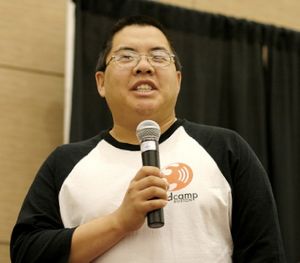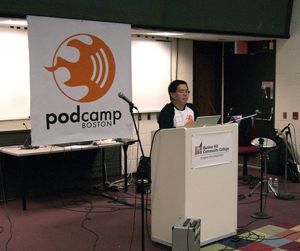Christopher Penn Talks Changes At PodCamp Boston
Jul 15th, 2008 | By Elisabeth Lewin | Category: Citizen Media, Featured Story, Podcasting, Podcasting Events  The third in a series of Boston-area open space unconferences for podcasting and new media enthusiasts, PodCamp Boston is coming up this weekend, July 19-20, 2008, at The Joseph Martin Conference Center at Harvard Medical School, 77 Avenue Louis Pasteur, Boston, MA.
The third in a series of Boston-area open space unconferences for podcasting and new media enthusiasts, PodCamp Boston is coming up this weekend, July 19-20, 2008, at The Joseph Martin Conference Center at Harvard Medical School, 77 Avenue Louis Pasteur, Boston, MA.
Unlike previous PodCamps, walk-in registrations cannot be accepted (building security needs a list of attendees). The deadline for registering for this weekend’s PodCamp Boston is noon (ET) Wednesday, July 16.
In advance of the upcoming conference, and in light of some of the changes being made for this edition of the gathering, PodCamp co-founder and organizer Christopher Penn (creator and host of the Financial Aid Podcast) took some time out to answer my questions about the event.
On PodCamp Boston 3
Elisabeth McLaury Lewin: How many people are you expecting?
Christopher S. Penn: As of right now [Tuesday evening, July 15], 410.
Elisabeth McLaury Lewin: What are folks going to do there? What can participants look forward to? What new things are happening this time around?
 Christopher S. Penn: Ah, this is the big question.
Christopher S. Penn: Ah, this is the big question.
This year’s theme is “The Conference is the Hallway”. We’ve heard from participants at past conferences, especially SxSW, feedback like, “Well, the sessions sucked, but the conversations in the hallway were good.” The organizing team this year put our heads together and said, okay, what makes the hallway conversations special, and can we replicate some of that as part of the conference itself?
Some of the conclusions we came up with – first, cut the number of sessions in half and double the length of the breaks so that people can have longer conversations. The Harvard Medical School, is an academic facility, which structurally lends itself more to collaboration and conversation than, say, a convention center, which is structurally optimized to move large groups of people from point A to point B.
Most of all, we’ve got three new session types that people can experience. For folks new to PodCamp, new to new media, we have traditional, mainstream conference style sessions that can provide newcomers accustomed to other conferences with a level of comfort and order.
For the folks who want to be more adventurous, we’re introducing an ongoing session called BrainTorrent. We’ve taken one of the largest rooms in the conference center and put round tables with 8-10 chairs per table in the room. Each table can have a theme or topic, and rather than presenters standing in front of a room lecturing, participants at each table can share ideas, code snippets, shortcuts, etc. and collaborate on each other’s projects.
For example, if there’s an SEO table, we can each share things that have worked well to get Google to notice our web sites – I might offer everyone at the table a tip on using Digg, you might offer a tip on YouTube or Flickr, and someone else might offer a suggestion for getting inbound links. At a podcasting table, a sound expert could help you fine tune your mix, while you might be able to share ideas about how to market and distribute your podcast.
The other two session types are fun, ad-lib style sessions – Pecha Kucha and Battle Decks. These are for folks who need a break from the high intensity, high energy activities and want to have some fun while practicing presenting to others. Pecha Kucha is a presentation contest where you have 20 slides, 20 seconds per slide, and you have to convey your message in that time, about 6 minutes, 40 seconds total.
Battle Decks is even more fun. You pick a topic you’re knowledgeable about, and 10 slides featuring 10 random photos you’ve never seen before will be displayed. You have to work the slide content into your presentation on the fly.
As always, we obey the Law of Two Feet, but Harvard’s facility really encourages lots of casual conversation. There are lounges with chairs all over the place, and unlike previous years, we have rented the entire facility, so there will be no distractions – it’ll be all PodCamp, all the time.
Elisabeth McLaury Lewin: The first two PodCamp Bostons were about a year apart, but this third edition comes only 9 months after the most recent one. Why so soon?
Christopher S. Penn: That was a largely economic decision. In Boston, the moment colleges open for the fall semester, prices go up, up, up, so we had to do it in the summer.
Changes With This PodCamp
Elisabeth McLaury Lewin: You and Chris Brogan were the pioneers who started the PodCamp phenomenon. It has really taken off, blossomed all over the world. Part of the philosophy of the gathering that you crafted focused on an agenda created, on-the-spot, by the conference participants.
Another piece of the philosophy was maintaining a low barrier to entry: the event was free to all comers. As time has gone on, I’ve seen these “rules” gradually change. PodCamp sessions are devised (still by participants) months in advance, instead of on the fly. Now, with this weekend’s PodCamp Boston, there is a fee to register. Why the change?
 Christopher S. Penn: This time was actually closer to the original – we opened up the schedule as a Google Doc spreadsheet and let everyone arrange it for a certain period of time, so the sessions as you see them are as the crowd developed it.
Christopher S. Penn: This time was actually closer to the original – we opened up the schedule as a Google Doc spreadsheet and let everyone arrange it for a certain period of time, so the sessions as you see them are as the crowd developed it.
There are two reasons we’re charging for PodCamp Boston. The first is economic – the facility itself costs a lot of money. As PodCamps have gone on, the no-show rate has crept up to levels that make planning a successful event very difficult. Last year, we had a no show rate that approached 60%.
When it’s just people hanging out, that’s one thing, but when you talk about material costs like shirts, refreshments, etc., there’s a real economic cost to a no-show.
My friend Laura Fitton remarked that PodCamp has never been free – it’s always been subsidized solely by sponsors, and when large quantities of no-shows happen, sponsors have to question whether PodCamps are worth their support when marketing dollars are scarce. By having an economic incentive to show up, we can in turn let sponsors know that the people we promise are coming are likely to be there – which in turn assures future sponsor support for future PodCamps around the world.
The second, and more important reason, is social. We’re asking members of the community to make a tangible commitment to BE there for each other, and in a capitalist society, the easiest way to demonstrate a commitment is with money. There are folks who come from all over the world to PodCamps. I’ve been at PodCamps where people from other continents flew in just to be a part of the group.
Imagine how excited someone could be to see that they might be able to meet a favorite online acquaintance in real life, only to find on the day of the event that the person instead chose to go fishing because it was a nice day out. We’re asking participants to reinforce their social commitment with a financial commitment at this PodCamp.
I want to make one thing clear – just because PodCamp Boston is charging does not mean other PodCamps will or should. The decision about whether to ask for a financial commitment is up to individual organizing teams, and is not a blanket rule.
Getting Involved With PodCamp Boston
Elisabeth McLaury Lewin: When’s the deadline for registering?
Christopher S. Penn: Wednesday, July 16, noon Eastern Time.
Closing Thoughts: PodCamp as Creative Process
Elisabeth McLaury Lewin: What have I forgotten to ask, that you think people ought to know?
Christopher S. Penn: Despite changes, PodCamp is still your conference, your event. If you attend, don’t be a spectator. Participate. If there’s a discussion, join it. If you see someone who needs help, lend a hand. If you have something to share, bring it. If you don’t know someone, introduce yourself.
I liken PodCamp to art. PodCamp organizers get out easels, brushes, paint, and canvas for you when you come to PodCamp, and then get out of the way. What you go home with is entirely up to you. You could go home with a blank canvas, or you could go home with a masterpiece. It all depends on how much you put into your experience.
And of course, I have to do my fiduciary and social duty and commend sponsors mDialog, Blue Sky Factory, Mzinga, Utterz, and many others for their continued generous support of the community. Even with a financial commitment, PodCamp could not happen without their support, and we thank them gratefully.
Images: CC Chapman, Eric Olson